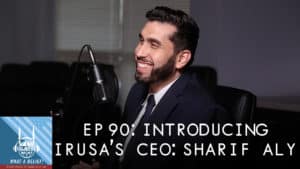 On this episode of the What a Relief Podcast B.C. Dodge plays “Get to Know Your CEO” with Sharif Aly.
On this episode of the What a Relief Podcast B.C. Dodge plays “Get to Know Your CEO” with Sharif Aly.
Aly was appointed CEO in April, after former CEO Anwar Khan moved to the role of President of IRUSA.
Dodge began the interview with a “gotcha” question he acknowledged was designed to make the new CEO as uncomfortable as humanly possible.
“As the CEO of Islamic Relief, I’m sure you are aware that your social media is under scrutiny by those outside the organization,” Dodge said ominously.
Sharif acknowledged that he is aware of that.
“And I’m also sure that you’re aware—since you’re literally in the building — that IRUSA is based outside of the metro Washington D.C. area.”
The answer was yes again.
“Well I want you to explain these Knicks Tweets you have posted,” Dodge said. “This is Wizards country—we don’t deal with people that support outside basketball teams.”
Laughing, Sharif said that after being born and raised in New York, he couldn’t leave his allegiance behind.
Then the two discussed Sharif’s years in advocacy at IRUSA. Before his current position, Sharif worked as a lawyer at other organizations and then at IRUSA, where he focused on advocacy work for four years. As advocacy council, he engaged with policymakers in the United States and the United Nations.
Humanitarian aid doesn’t always solve problems, he said: “Sometimes the root of the problem is policy.”
One critical policy area is refugee resettlement, especially now, when 65 million people are displaced from their homes. “People need to find a stable location to settle their families,” he said.
Then Dodge asked about Sharif’s vision for IRUSA under his leadership. The CEO said he is focusing on enhancing development work and on ensuring that our response doesn’t leave out any marginalized communities like the elderly and people with disabilities.
“We started as an emergency response organization that was committed to respond as soon as an emergency occurs,” he said. “We’re never going to lose that as our core.”
But the ultimate goal is for no one to need aid anymore. That means enhancing our development projects that enable self-sufficiency. “Because our job is not just to put band-aids on wounds,” he said, “but it’s for us to solve the root of the problems.”
Dodge responded that it’s time to move on from distributing one-time items like blankets.
Sharif agreed that distributing aid only helps for so long, but he contended that it’s still essential.
“It really doesn’t make a lasting impact,” Sharif said. “But it’s so needed too. When you need a blanket, you could care less about education at that point—you need that blanket. But if you want to be taken out of long-term poverty issues, then you need that education.”
Sharif said that during a past famine in Ethiopia, one-third of schools were shut down because students weren’t attending—they were helping their families find water and food.
“That’s why humanitarian aid is also helpful, because you prevent a bigger harm from taking place,” he said. “You don’t have time for education when you don’t have food or water. You need that food and water to get access to education.
“Both elements of our work are so important and they work together so well. We just need to build upon the long-term part … to make lasting change.”
Sharif also said we need to improve our communication with donors to focus more on those long-term issues. Our communities respond with incredible generosity in emergencies. But not everyone knows about their opportunities to do long-term development work with IRUSA.
That’s how Sharif wants people to eventually think of IRUSA.
“At the end of the day, what I want people to think of is IRUSA is transforming lives,” he said.
One of his goals is for supporters and partners to know that IRUSA is committed to finding solutions to deep-rooted problems behind issues like poverty—problems like imbalances of power where some people are excluded from the economic process.
“And we’re committed also to getting your feedback,” he said. “And we’re here to listen, humble ourselves to know that we don’t know all the answers and find the best solution together.
Dodge picked up on the reference to IRUSA’s tagline: “Together—so we can make a better world.”
“That was like a softball,” Sharif said. “I’m glad you hit that.”
**And now you can reach out to us at our new email address: [email protected]!**
“What a Relief!” is the official podcast of Islamic Relief USA. Hosted by social media specialist B.C. Dodge, IRUSA’s “What a Relief!” puts a human face on what’s going on in the world and how you can enact positive change in it. New episodes every week!
LISTEN. SHARE. REPEAT.